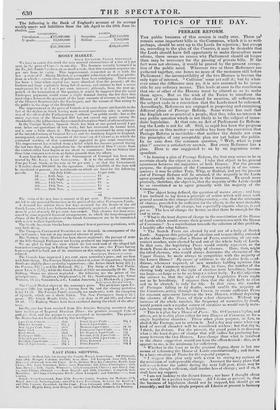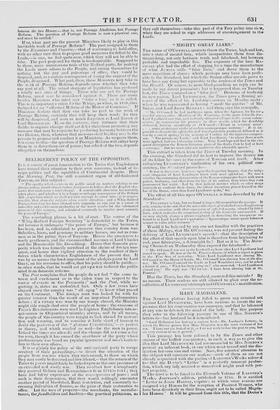TOPICS OF THE DAY.
PEERAGE REFORM.
Tnz public business of this session is really over. There yet remain some important bills in the Commons, which it is as well, perhaps, should be sent up to the Lords for rejection ; but except as, according to the plan of the Courier, it may be desirable that the Lords should have full opportunity to make themselves more odious, there seems no reason why Parliament should sit longer titan may be necessary for the passing of private bills. If the fact were not obvious, it would be proved by the present occupa- tion of the public mind. Wherever two or three Reformers are gathered together, one hears no more of the measures still before Parliament : the incompatibility of the two Houses is become the only topic of interest. " Collision" some yet call it; but by what- ever name the difference may go, it is now assumed to be incur- able by any ordinary means. This leads at once to the conclusion that one or other of the Houses must be altered so as to make them agree. But as the wish of the Tories to unreform the House of Commons is too absurd for mention, all reflection on the subject ends in a conviction that the Lords must be reformed. Accordingly, Reformers arc engaged in proposing and examining different plans of Peerage Reform. Some writer has said that the English are so practical a people, that they take no interest in
any public question which is not likely to be the subject of imme- diate legislation. At that rate, an Act of Parliament for Reform- ing the Lords is not far off. Still, so rapid has been the progress of opinion on this matter—so sudden has been the conviction that Peerage Reform is inevitable—that neither the details nor even the principles of any acceptable plan are yet before the public. In no case does the common question, " Well, what is your plan ?" receive a satisfactory answer. But every Reformer has a plan. Ilere is one suggested to us by an ingenious corre- spondent.
" In forming a plan of Peerage Reform, tine first step seems to be to ascertain clearly the object in view. I take that object to be, general agreement between the majorities of both Houses. For the present purpose, the disposition of the Commons majority is of no conse- quence: it may be either Tory, Whig, or Radical, and yet the present end of Peerage Reform will be attained, if the majority in the Lords agree generally with the majority in the Commons. To speak more precisely, therefore, the object is, that the majority of the Lords should he so constituted as to agree generally with the majority of the Commons.
" The object being defined, the question of means arises : and here I am inclined to lay down a principle of action which will meet with general assent in this change-disliking country,—viz. that the minimum of change, provided it be sufficient for the object, is the most desirable quantity. Perhaps all change, but espeeiallly organic change, is evil per se. The less of change the better, so that there be enough for the end in view.
" What is the least degree of change in the constitution of the House of Lords which would secure their general concurrence with the House of Commons ? As a contribution towards the solution of this problem, I humbly offer what follows.
" The Scotch Peers are elected by and out of a body of Scotch Lords. Suppose this principle of election and respoesibility extended to the whole Peerage—that a House of Peers, consisting of any con- venient number, were elected by and out of the whole body of Lords. In that case, the legislating Peers would strictly represent, as the Scotch Peers do now, a select body of electors. How, then, might the titled electors, who would always determine the character of the Upper House, he made always to sympathize with the majority of the Lower lIouse? By means of additions to the elective body,—ad- ditions, whenever required, of new members holding opinions like those of the Commons majority. But, in tunic, the number of the electing body might, if the right of election were hereditary, become too large—so large as to be no longer a select body. To this objection the answer is, that the right of electing Legislative Peers ought not to be hereditary. I suppose then that the right both to elect
and to be elected, is only for life. In that case, the number of Peerages falling in by deaths, would enable the majority of the Commons, acting through the Crown, to create sufficient Peers for constant agreement between the two Houses, without depriving the electors of the l'eers of their select character. Without any increase of the whole number, the frequency of vacancies, by death, would permit such a regular course of creations as would surely main- tain harmony in the whole Legislature.
" This is a plan for a House of Peers: Mr. O'CONNELL'S plan, and others, are in reality plans either for two Houses of Commons, or for a single legislative chamber. Those other plans propose, in fact, to abolish the Peerage, not to reform it. And a day may come when any kind of second chamber will be considered useless: but that day is, I think, far distant. For the present, the grand point is to discover what is the least degree. of change that will suffice for producing har- mony between the two Houses. Less change than what is involved in the above suggestion would not have the effeetdesired : this, as it appear; to me, is the minimum for sufficiency. " Whether in the least or in the greatest degree, there is but one means of roforming the I louse of Lords constitutionally; and that is, by a large creation of Peers for the especial purpose. " I suggest this plan only with a view to stating my notions of the miniamin of indispensable change. Amongst the many plans that will coa.e bothre the public during the next half-year, there may be one i though sufficient, shall involve less of change; and if FO, it shall have any support.
" I am not looking to the distant future; nor have I thought about i
what would be a perfect legislature. All I desire at present is, that the business of legislation should not be stopped, but should go on smoothly; and for this single purpose, all I desire at present is harmony between the two Houses—that is, not Peerage Abolition, but Peerage Reform. The question of Peerage Reform is now a practical one, and must be settled."
If so, what part are the present Ministers likely to play in this inevitable work of Peerage Reform? The part assigned to them by the Examiner and Courier,—that of continuing to hold otlice, with no other view than to propose good measures fordefeat by the Lords,—is one, we feel quite sure, which they will not be able to take. The part proposed for them is too despicable. Supposed to be there, mere unconscious tools of the Radical party, for making the Lords more odious to the People, and caring themselves for nothing but the pay and patronage of otlice, they would be despised, and, as a certain consequence of lasing the support of the People, dismissed. What part, then, these Ministers may take in the work of Peerage Reform, depends upon whether they take any part at all. The actual stoppage of legislation has produced a totally new state of things. Those who are not for Peerage Reform, must now be considered against it. There are many besides Ministers who must now " take a line,- as it is called.
This is as important II crisis fir the Whig, when, in 1830, they declared fn. an "effectual Reform of the House of Commons.' If Ministers declare that they can take no part in the work of Peerage Reform, certainly they will keep their word; for they will be dismissed, and soon as much forgotten as Lord RIPON or Lord Bitourrn Am. If, on the contrary, they intimate that their dislike to organic change shall not doter them from promotin!, any measure that may be requisite for producing harmony between the two Houses, then, whatever that measure shall be, they may be the persons to propose and conduct it as Ministers. As respects them, it is come to this—the question of Peerage Reform will either keep them in or drive them out of power; but which of the two, depends altogether on themselves.



























 Previous page
Previous page